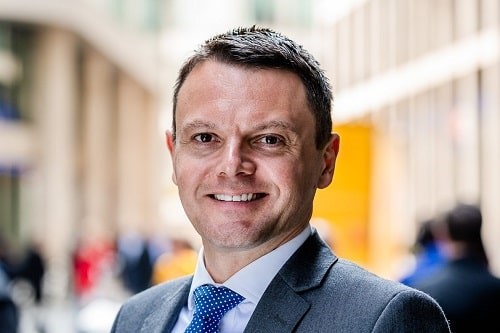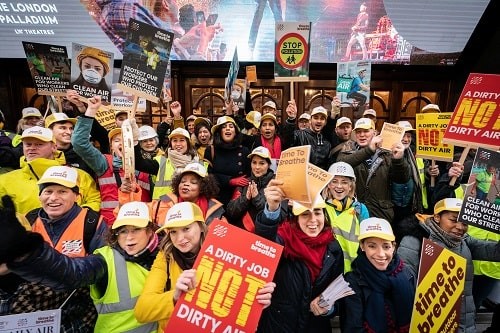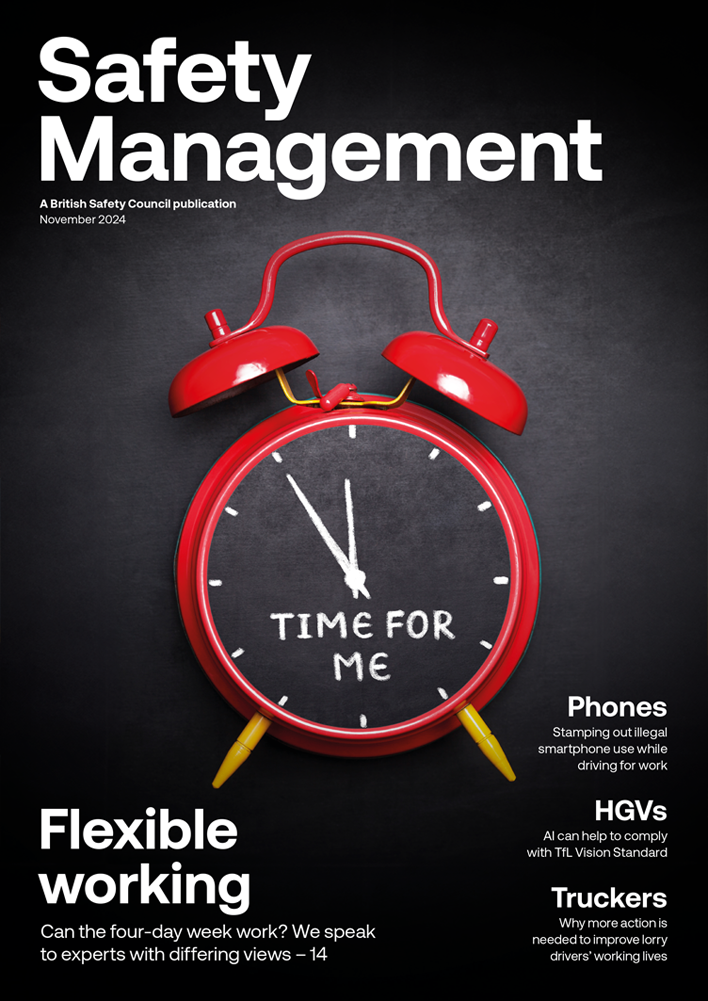Safety Management catches up with Peter McGettrick as he joins the British Safety Council as its new chair. We find out about his priorities for the organisation, what challenges lie ahead and the work he’s most looking forward to doing.
Features
Interview with Peter McGettrick, British Safety Council’s new Chair
With more than 15 years’ experience in leadership positions, Peter is currently managing director of Advisory within Turner & Townsend. Here he keeps himself busy by overseeing more than 450 professionals working across sustainability, contract services, technology, operational excellence, health, safety and quality. To relax he likes a game of squash, and he’s from Glasgow so is proud to see the UN Climate Change Summit, COP26, take place there for the first time. We discover much more about Peter below.
- You’ve been on the board of the British Safety Council for three years. What work has particularly stood out to you in that time?
I think the British Safety Council has a great executive team and Board of Trustees who work well together. In the coronavirus pandemic we needed that strong bond to work together and navigate the choppy waters. In terms of work which stands out, I think the growth of our Indian business has been really impressive – the work we’re doing there, and the clients and the difference we’re making in India is really remarkable. I’m looking forward to seeing the India team grow in the months and years to come and us start to leverage that influence that we’re building there.
 Peter McGettrick is British Safety Council's new chair
Peter McGettrick is British Safety Council's new chair
- What will be your priorities to focus on as new chair?
The British Safety Council has been helping people navigate their way through the pandemic while trying to navigate it ourselves. As organisations are moving out of the pandemic phase and thinking about here and now there’s a big opportunity for us to have a stronger voice in this space and help people navigate the next phase of organisational development. Organisations are waking up to the fact that their people are their biggest asset and are starting to formulate going back to work policies, or agile working policies, trying to get the best out of their staff. I think the British Safety Council can help influence those decisions through our campaigns.
- The organisation has grown in the past few years and is now more complex – the India office, Mates in Mind, Being Well Together have all come on stream. How do you see yourself representing the Group’s work?
I’m a health and safety professional myself so I can relate to the work the British Safety Council does. The great thing about the British Safety Council is it operates across multiple geographies and markets; for example, supporting improving wellbeing in the UK but also driving a fast improving a culture of safety through our work in India and the Middle East.
- What do we do best at the British Safety Council, and what would you like to help us be better at doing?
I think that the British Safety Council has a really strong brand and reputation for excellence, and we have delivered some amazing campaigns in the past, but I’d like to see us do more campaigning and leveraging that influence and that brand that we have. I’m looking forward to getting involved in the Time to Breathe campaign at COP26 and discussing wellbeing and our Keep Thriving campaign at the Houses of Parliament in the coming weeks.
 Members of the British Safety Council outside London's Palladium theatre for the Time to Breathe demonstration in March 2019.
Members of the British Safety Council outside London's Palladium theatre for the Time to Breathe demonstration in March 2019.
- Why do you think it’s important that the health and safety community engages with climate change? What role will SHEQ professionals play in managing climate change adaptation for example? Or in achieving the road to net zero emissions?
I think in the future in 10 years’ time we will look back at 2021 and we will be surprised at what was considered normal – in terms of the food we eat, the transport we use or the way we power our homes. It’s similar when you look back at the safety norms that existed – we recoil in horror at the lack of protections at work, which would have been considered normal in their day. So, I think there’s lots of similarities with the road to net zero and health and safety professionals can help with that transition and that change.
But there’s other aspects to it as well. Climate change increases the risk to workers’ health and safety – especially those who work outdoors or in hot, indoor environments and are at increased risk of heat stress and other heat-related disorders. Outdoor workers are also exposed to poor air quality, so I think health and safety professionals have a responsibility to understand the link between climate change and safety at work, to ensure that standards are raised and employers are mitigating those risks at work.
- Are you concerned about what we can achieve at the Climate Change Summit (COP26). Or are you excited?
I suspect that COP26 will be considered both a success and a failure depending on the eyes its seen through. What’s clear to me is the need for urgent and immediate action and although some of the announcements that have been made so far are taking us in the right direction, I fear that they are not ambitious or detailed enough to make the progress we need.
- The way we work has changed with many working remotely or hybrid. What do you see is the greatest opportunity, and the greatest risk that employers need to navigate with this change?
I think we have a new opportunity for a more agile working pattern. The pandemic has shown you can work from home and be effective. I think the opportunity to work in a hybrid way helps meet the needs of a more diverse employee population, who maybe couldn’t work 9 to 5 in the office but could in a hybrid environment. That opens up opportunities to more people which is great. I think the risks that employers need to navigate with these changes are around maintaining the culture of the organisation and making sure people are born into that culture when they’re working remotely and not diluting the culture of the organisation.
- How do you operate as a leader, and what leadership qualities will you be bringing to the role of chair?
I am the MD of an advisory business overseeing hundreds of people working across a range of different services, but, in any kind of organisation it’s important to get the best out of the people you are working with. Being able to relate to people – the tasks they are doing and the challenges they are facing – is essential in being able to work together. I don’t micromanage, but I find myself getting involved enough to be able to help people and give them the tools they need to be successful.
You put yourself in their shoes and try to understand how to motivate them, how to help them be the best they can be, whether that’s giving them additional resources, or support and a sense of purpose. That’s a big part of my job that I enjoy.
Peter is originally from Glasgow where he obtained his Bachelors, Masters and MBA degrees. Here’s a few other things we learned about Peter:
What are you reading currently?
Shuggie Bain by Douglas Stewart. It won the Booker prize last year and is set in Glasgow in the 1980s where I grew up.
Favourite UK holiday destination?
St Andrews, in Fife in the North-east of Scotland. I’ve been going there for years and I absolutely love it. It has a world class golf resort and university in the same small place, which provides an amazing environment for some great facilities; hotels, restaurants and so on.
Did you learn a new skill in lockdown?
We got a dog early last year and we’d never had one before – she’s a Labrador puppy called Myla. After the kids have their fun, it’s up to me and Verity to look after her so we’ve all had to learn how to integrate her into the family. They do like to chew things!
Signature dish?
I am the main cook of the house so am always trying out new dishes, but if you ask my family it’s chilli con carne.
Walk before work or straight to the desk?
I’ve been going to the office regularly four days a week, so I always have my commute walk to enjoy.
Favourite film?
Too many to choose. My friend’s eleven-year-old son is starring in the new Kenneth Branagh film Belfast – so I’m really looking forward to seeing that.
Most inspirational figure? (Living or dead)
My grandmother was a real matriarch of the family. She was born in London and worked during the Blitz – her workplace on Fenchurch Street was bombed several times so she joined the Women’s Royal Navy Service, known as the Wrens, and was posted to Sri Lanka (Ceylon then). She met my grandfather who was a BBC war correspondent in Burma and after the war they settled in Glasgow and had nine children. Unfortunately, she passed away last year before her 100th birthday – but she leaves a great legacy and she was amazingly inspirational.
FEATURES

Winter pressures mean good mental health support is crucial
By Kevin Bampton, British Occupational Hygiene Society on 01 December 2021
I will tell anyone who cares to listen that winter 2020/2021 was a historic moment in British social and economic history. British business became, for the first time ever, my public health hero.

The big sleep
By Marcus Herbert, British Safety Council on 01 December 2021
Poor quality sleep can affect both our physical and psychological wellbeing, but simple lifestyle changes can make a big difference.

Why changes to recycling legislation in England are an opportunity, not a burden
By Adriana Olaya Rodriguez, Newell Brands on 12 November 2024
From March 2025, many businesses in England will have to begin separating their recyclable and food waste from general waste prior to collection, but the changes will bring wider business benefits, such as reduced waste disposal costs and improved sustainability credentials.



